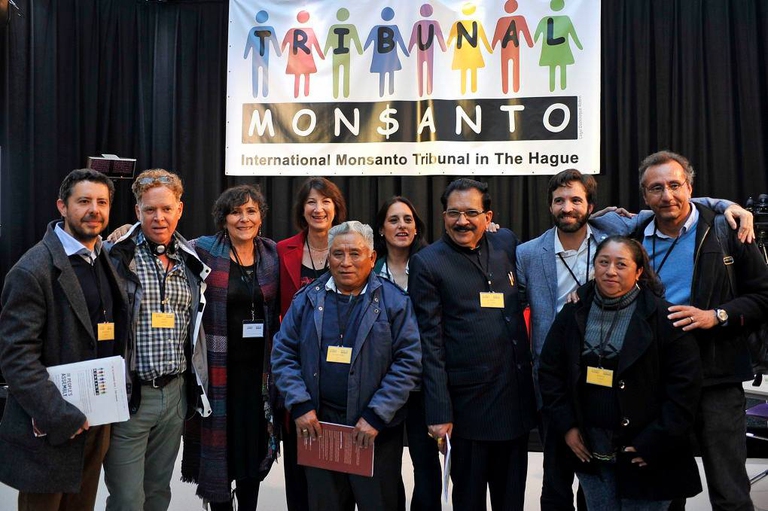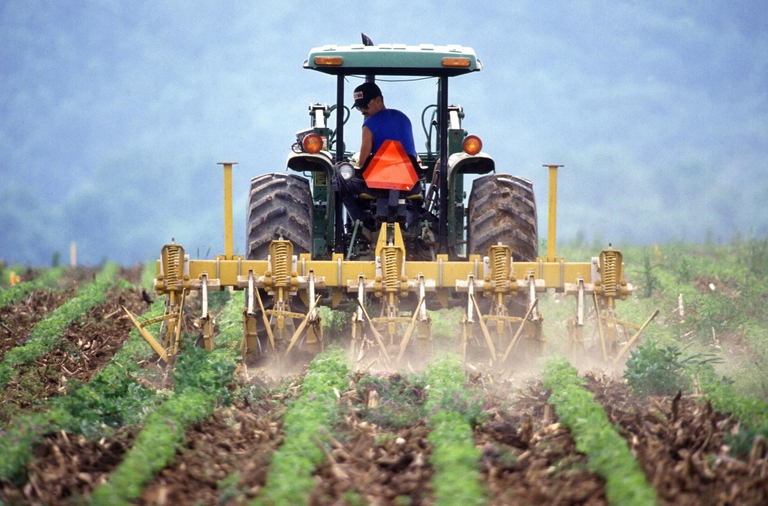
The fraud and corruption witnessed in the illegal introduction of Bt cotton in India are now being repeated with GM mustard. Farmers and our biodiversity were sacrificed for Monsanto’s profits.
La Monsanto è stata giudicata colpevole di “ecocidio” secondo l’International Monsanto tribunal, un tribunale creato dalla società civile per fare pressione sulla multinazionale chimica.
Monsanto is guilty. This is the latest verdict of the International Monsanto Tribunal, an international civil society initiative aimed at trying the activities of agrochemical giant Monsanto. The company specialising in agricultural biotechnologies, such as GM seeds and phytosanitary products, has been found guilty of human rights violation, including the right to food and health and the right to a healthy environment. Also, Monsanto’s conduct has negatively affected scientists’ right to freedom for scientific research. Five judges of the (non-binding) Monsanto tribunal have presented their conclusions on 18 April at The Hague, in the Netherlands, calling on the agrochemical giant to adopt important changes to comply with international law.
Read also: Seeds of Freedom, Manu Chao’s new song against Monsanto
The International Monsanto Tribunal is a civil society initiative aimed at assessing and raising the awareness of people, governments and international organisations on the health and environmental damages caused by the US multinational, recently acquired by German pharmaceutical giant Bayer. The trial was held on 15 and 16 October 2016, but conclusions have been released on 18 April in order to allow the five judges to re-elaborate declarations from experts and 30 international witnesses. The Monsanto Tribunal also aims to create a precedent that could be of help to people suing Monsanto or other agrochemical companies. Despite the precedent isn’t legal, the Tribunal aims to create a mechanism that allows the compensation of victims.
One of the main charges against Monsanto is the threats it poses to biodiversity, which has been heavily affected by the increasing number of farmers using the same GM seeds created by Monsanto. “By reducing crop biodiversity and local plants, Monsanto has interfered with the right to food and is moreover aggravating the risks of food security and undermining the resilience of local food production systems,” reads the report.
Sign the European Citizens Initiative to stop glyphosate
Another charge, presented by many direct witnesses, is the impact of GM-seeds on the rights of farmers. For instance, those who refused to buy the seeds marketed by Monsanto had their fields polluted anyway and were prevented from certifying their crops as organic. These lands, indeed, have been affected by an uncontrolled use of herbicides, such as glyphosate, in nearby areas.
In some cases, farmers were even forced to pay property rights: “Furthermore, Monsanto has aggressively pursued intimidation tactics that have damaged the fabric of communities and caused great anxiety and mental affliction”. According to judges, such practices “are in contradiction with the principle of human right to food which guarantees access to nutrition, the basic need for every human to exist”.
According to the five judges, the activities of Monsanto can constitute a crime of ecocide (if such a crime were recognized in international criminal law). The term is used to define the loss of biodiversity and natural ecosystems, as well as the damages caused to people’s health. To sum up, Monsanto’s ecocide includes the large-scale introduction of harmful chemical substances and the production of genetically modified organisms, which expose people to risks like an increase in insecticides and herbicides, such as glyphosate, and polychlorinated biphenyls (PCBs), banned by the 2001 Stockholm Convention on Persistent Organic Pollutants.
Monsanto has also negatively affected the freedom of conducting scientific research, a right close to the freedom of thought and expression. According to witnesses, the multinational operated “to discredit and shut down scientific research and debate that threaten its commercial interests, promoting weak regulatory processes, and using bullying and illicit tactics to pressure countries to permit the marketing of its products. In the result, sound scientific inquiry and debate is undermined or silenced, with the consequent effect of increasing risks to health and the environment”.
Despite these activities have been carried out thanks to the voluntary work of civil society, it should be noted that the precautionary principle is in force on an international level. The principle allows taking action to safeguard the environment in the presence of clear threats, even in the absence of scientific consensus. For this, it’s crucial signing and taking part in the European Citizens Initiative to ask to ban, once and for all, glyphosate in the European Union. Even if scientific studies disagree about the carcinogenity of glyphosate, acting in advance could be crucial for our health. Just like it happened with DDT in the 1970’s. The petition against glyphosate requires 1 million signatures to be valid. 700,000 people have already signed. It only takes one minute.
Siamo anche su WhatsApp. Segui il canale ufficiale LifeGate per restare aggiornata, aggiornato sulle ultime notizie e sulle nostre attività.
![]()
Quest'opera è distribuita con Licenza Creative Commons Attribuzione - Non commerciale - Non opere derivate 4.0 Internazionale.
The fraud and corruption witnessed in the illegal introduction of Bt cotton in India are now being repeated with GM mustard. Farmers and our biodiversity were sacrificed for Monsanto’s profits.
Corporations are putting our lives and our environment at risk through a growing and improper influence over institutions, whose responsibility should be, instead, protecting people and the planet. The visible consequences have made it imperative to expose their devious tactics and their steadfast and corrupt lobbying, recently revealed in the Poison Papers (a compilation of over
Monsanto has said yes. After 5 months of negotiations and hesitations, the US company has accepted Bayer’s offer of 66 billion dollars, debt included. So, the value of each share is now 128 dollars, up from Bayer’s previous offer of 127.50 dollars a share. In addition, the German pharmaceutical company has pledged to pay a
A report by Ember explains that in 2025 electricity generation from renewables (solar, wind and hydropower) surpassed that from fossil fuel sources.
The Tyler Prize, considered the “Nobel Prize for the Environment,” has been awarded to Toby Kiers, an American biologist working in Amsterdam.
To prevent the risks of glyphosate, a carcinogenic herbicide used in transgenic crops, the European Parliament opposes the import of three GM soybeans.
Glyphosate, one of the world’s most used herbicides in agriculture, has devastating, dramatic effects on the health of people living in very close contact with it. This time, the warning does not come from environmental organisations or WHO’s agencies, but from a photo feature. Pablo Ernesto Piovano is an Argentinian photographer that decided, in 2014, to
Weed killer glyohosate is harmful for the health and environment: the Committee of Environmental Associations and Organic Farming asks the Italian Government to banish it.
A political, social, and ecological album: The Monsanto Years will be released on 16 June, but the album’s title talks turkey. Neil Young has always been on the front line to raise fans’ awareness on environmental and sustainable farming issues and, after having taken a stand against large oil companies in Canada, he now rails









